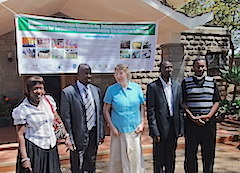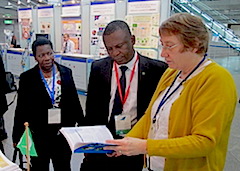| |
|
 |
International recognition for ARC’s ‘inspirational’ faith-based educational programme
November 19 2014:
 |
 |
 |
Dr Dorcas Otieno (left) and Mary Bellekom (centre) at an ESD workshop in Kenya |
Over 1000 delegates from around the world attended the UNESCO World Conference on Education for Sustainable Development (ESD), held in Aichi-Nagoy, Japan in November 2014 to mark the end of the UN Decade of ESD. As well as a programme of talks and workshops the event had an exhibition of good practice to which only 25 projects had been invited, one of them being the Faith-based Education for Sustainable Development toolkit and programme for faith schools developed by ARC and our East African partner organisations and piloted in schools throughout Kenya since 2013.
“It was so good to be in a place where people believed in ESD,” commented ARC Education Project representative Mary Bellekom, who attended the event. “We had interest from people from all levels - grass roots workers alongside Ministers of Education - and literally from all around the world. It seemed to make sense to them all that we integrate faith values into ESD as a practical way of achieving it. For some people that was a real eye-opener but others had thought about it already. They just hadn’t realised it could be integrated in practice. It was amazing how many of the workshops and meetings brought it up as an example of something effective that could really be achieved.”
Encouraging feedback
 |
 |
 |
Tanzanian dignitaries Dr Shukuru Kawambwa (MP), Minister of Education and Vocational Training and Ms Salome T. Sijaona Ambassador Extraordinary and Plenipotentiary learn more about the ESD toolkit from Mary Bellekom |
In the course of the conference Mary, her colleague Dr Dorcas Otieno, Executive Director of the Kenya Organisation for Environmental Education (KOEE) and Mr Barasa Wafula (KOEE) gave out 600 copies of an explanatory booklet and over 100 copies of the toolkit itself. The comments in the visitors book for their exhibition stall speak for themselves, from the Nigerian educationalist who wrote “You are really contributing to ESD for humanity” to “Fantastic work” from an education ministry official from Brunei and “Congratulations” from Dr Shukuru Kawambwa, Minister of Education and Vocational Training, Tanzania. The word that crops up the most is ‘inspirational’.
Mary Bellekom is hopeful that this positive response means the approach will be developed on a far wider scale: “It was gratifying to bring something we’d been working on for so long to a wider public arena and see it generate so much interest. I do think we got people thinking how it could apply to their situation.”
Official recognition in KenyaShortly after returning from the conference the team were delighted to learn that the Kenyan Ministry of Education has now accredited the ESD toolkit and programme, meaning that it can be used in all schools throughout the country. Training courses for teachers are also being run in Tanzania and the curriculum authorities in Uganda are assessing the toolkit with a view to adapting it to their local teaching methods.
Useful linksUNESCO report on the ESD Conference
How the ESD toolkit was developed
Downloadable copy of ESD toolkit
|
 |
 |
|
|
|
|
|
 |
Teachers' toolkit
ARC and its partners in sub-Saharan Africa have written a teachers' toolkit on faith-based education for sustainable development |
 |
Faiths for Green Africa
We are working with more than 25 Christian, Muslim and Hindu faith partners in Africa. |
 |
How does ARC work with the faiths?
We list some of the far-reaching ways that faiths can affect their environment |
 |
 |
|
|

